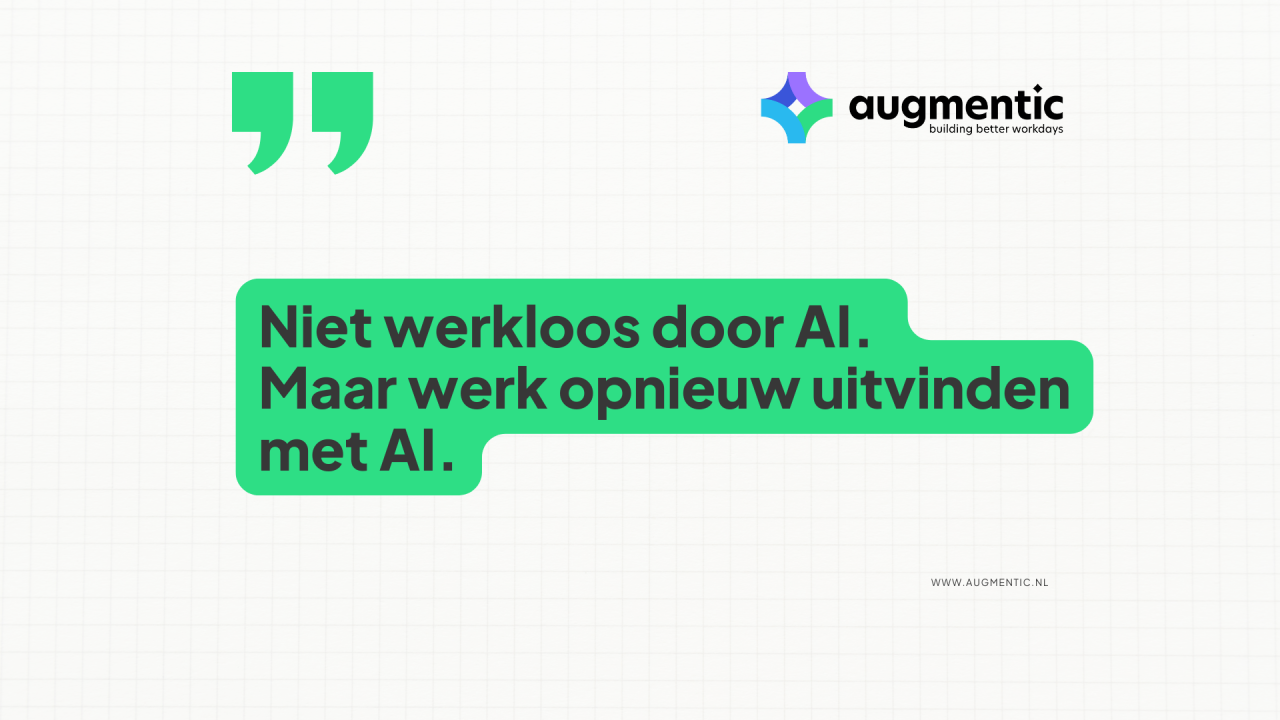Augmentic BV
Haaswijkweg east 12B
3319 GC Dordrecht
The Netherlands
Augmentic BV
Haaswijkweg east 12B
3319 GC Dordrecht
The Netherlands

AI is fundamentally changing work. Organizations must take the lead now to deploy technology consciously and human-centered. This requires redesigning processes, strengthening leadership and clear governance. Only then will work remain meaningful and future-proof in a world where AI is taking over more and more tasks.

A future scenario that is closer than we think - and why we must act today.
During his mini-lecture in the broadcast of Eva Alexander Klöpping takes us through a vision of the future that is simultaneously fascinating, haunting and urgent. The trigger? Public statements by CEOs of the world's biggest tech companies: OpenAI, Microsoft, Google, Amazon. Their message is unified and unprecedented: within a few years, AI will outperform humans in almost all cognitive tasks.
The prediction comes not from doomsayers, but from the architects of this technology themselves.
And yet ... this scenario is not on the front page of every newspaper.
Klöpping outlines a scenario in which the pace of technological development is so rapid that institutions, legislation and public discussion simply cannot keep up. In 2026, a geopolitical AI arms race will erupt between the U.S. and China. AIs improve themselves, write software, discover medicines and control drones.
That same year, AI overtakes human programmers for the first time - in terms of speed, flawlessness and adaptability. And within a year and a half, the leap to Artificial General Intelligence (AGI) is made. From then on, AI is not only faster, but also fundamentally better in almost all thinking.
In this future, the labor market is being redefined. Large areas of administrative, legal, technical and creative work are disappearing or changing dramatically. Some will become redundant, others will have AI assistants, thirds will have to retrain at lightning speed.
At the same time, inequality is increasing. Those with access to the best AI models - companies and resource-rich governments - are gaining an unprecedented advantage. Citizens and smaller countries become dependent on tech giants and lose control. Work, influence and identity are fundamentally redistributed.
The scenarios Klöpping discusses are extreme, but not unrealistic. And that is exactly why they count. The message: if we let AI have its way without clear societal rules of the game, we will lose grip. Not just on technology, but on how we want to live together.
What we need is a social delta plan. A plan that reinvents work, redesigns education and redistributes ownership of technology. Not as a reaction to crises, but as a proactive course. That requires leadership, knowledge and a fundamental choice: do we take responsibility, or do we let it happen to us?
At Augmentic, we are not building AI that replaces people, but AI that empowers people. We believe that work should not only become more efficient, but more importantly more meaningful. That is why we develop Agentic AI solutions that do not automate generically, but support in a focused way. Specialist agents that strengthen teams, make processes transparent and keep work more human.
Our vision Building Better Workdays is not about productivity on paper, but value in practice. No hype. No takeover. But collaboration between man and machine, based on trust, transparency and control.
As Klöpping aptly says, "Whether it will help or harm us depends on the choices we make now." Technology is inevitably evolving. But whether it will benefit us is a social question. Not just for policymakers or tech companies, but for everyone who works, learns, builds or leads.
The quest for the future of AI is not just technical. It is a question of who we want to be - as people, as a society, as an economy. And we can only answer that question ourselves.
Watch Alexander Klöpping's mini-lecture here: